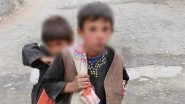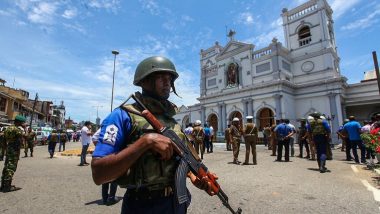Colombo, April 25: Sri Lanka on Thursday suspended its plans to grant visas on arrival to citizens of 39 countries after the devastating Easter suicide bombings that killed nearly 360 people. "Although arrangements were in place to issue visas on arrival for citizens of 39 countries, we have now decided to hold it for the time being in consideration of the current security situation," Tourism Minister John Amaratunga said in a statement.
"Investigations have revealed foreign links to the attacks and we don't want this facility to be abused," Amaratunga added. The visas on arrival pilot programme was part of a larger initiative to increase tourist arrivals to the country during the six month off-season period from May to October. Defence Secretary Hemasiri Fernando Resigns Following President's Reprimand
The island nation received 7,40,600 foreign tourists in the first three months of 2019. Around 450,000 Indians visited Sri Lanka last year and the island nation was expecting the total Indian tourist arrivals to cross one million mark in 2019.
Sri Lanka's tourism industry, which accounts for around five per cent of the country's GDP, is likely to suffer due to the Easter blasts. Tourism revenues in Lanka increased to USD 362.7 million in November from USD 284 million in October 2018, according to reports.
Meanwhile, the Lankan authorities Thursday intensified their raids with the help of the army and arrested 16 more suspects in connection with the country's worst terror attack that killed 359 people and left over 500 injured.
President Maithripala Sirisena has said that 139 people have been identified as suspects in connection with the attacks.
Addressing an all-party conference at the Presidential Secretariat here, Sirisena said that a Combine Operation Centre will be established within the defence ministry for the enforcement of the country's security measures from Friday.
Police spokesman Ruwan Gunasekera said that the police had searched several houses connected with the terrorist group which carried out the Easter blasts.
They are located in the Colombo city limits and the immediate suburbs of Dehiwela, Panadura, Wattala and Negombo. The houses have been sealed for further investigations.
The government information department in a release urged people not to believe any information other than the verified information issued by the department or the police spokesman.
False information led to the closure of the road to the Colombo international airport. The police searched suspicious car and found nothing, the police said.
Similar inputs were reported from several parts. The main bus terminal at the north western province capital Kurunegala was searched after a bomb alarm which proved to be a hoax.
A police internal memo which had warned of attacks by an extremist group on Muslim shrines and mosques was leaked to the media. It calls for the attention of the political leadership to the possible attacks on shrines.
Security has been beefed up around mosques in a bid to avert a possible attack during Friday prayers. "The State Intelligence Service has informed me of a possible threat by the same group which was involved in last Sunday's carnage," Chairman of the Dewatagaha Mosque in Colombo was quoted as saying by the Times Online.
He said that intelligence officers have also informed him that other mosques too would be warned of a possible attack in order for devotees to remain vigilant of possible threats.
Nine Suicide bombers, believed to be members of local Islamist extremist group called National Thowheed Jamath (NTJ), carried out a series of devastating blasts that tore through three churches and three luxury hotels on the Easter Sunday.
Many of the arrested people have suspected links to the NTJ. However, the NTJ has not claimed responsibility for the attacks. The Islamic State has claimed responsibility for the attacks and identified the seven suicide bombers who carried out the devastating blasts.













 Quickly
Quickly


